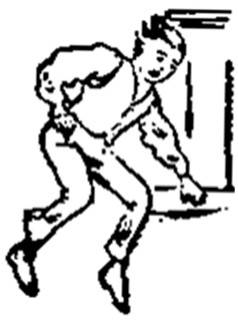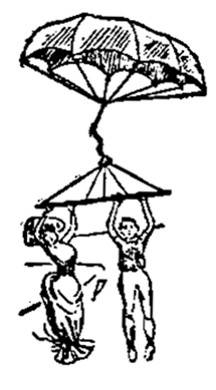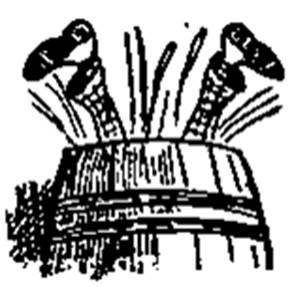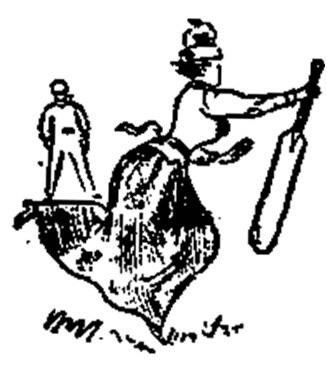This article has been transcribed from a copy of the Cardiff Times in the online collection of scanned Welsh newspapers 1804-1919 in the National Library of Wales, with grateful recognition of the free access accorded to all readers. Paragraph breaks have been introduced for easier reading.
Most of this article is self-explanatory. The first known balloon flight from Cardiff took place in 1828, though ‘Samuel’s’ readers may not have been aware of it. The pilot, Charles Green, disappeared over the Bristol Channel. The fourth illustration relates to the celebrated American act, the ‘Baldwin Brothers’, who performed high wire acts as well as balloon ascensions and parachuting, using handmade balloons filled with hot air which would ascend to 2500 feet as Ivy Baldwin (aka William Ivy) performed acrobatics and would parachute to the ground. ‘Jan van Beers' slaughter and charnel house daubs’ refers to the historical paintings of Jan van Beers ‘the younger’ (1852-1927), a Belgian painter , whose submissions to the salon of 1879 were described by J.K. Huysmans as ‘demented colours, absurd and crazy notions, a hotch-potch of ancient and modern mixed up on a single canvas’. By the date of this column he had become a hyperrealist painter of the beauties of the Parisian bourgeoisie. –– David Skilton

ERE are not enough dangers besetting us every day, on every side, and in every action of our brief lives, it seems, without our rushing into positions of peril that we create for ourselves. At any rate, some people seem to think so by the way they carry on. They are generally people who want to be ‘clever,’ don't you know – people who like to do[,] things that are of no possible good to humanity, but that no one of their immediate acquaintances has done. They like to describe how they hung on to a cloud by their eyelashes, or something of that sort. They would have just as much gratification, by-the-way, if they contented themselves with saying that they had done so when they never had – for scarcely anybody believes them when they do recount their feats. And the worst of it is that individuals of this sort very often find their ambition suddenly curtailed – their eyelashes give way, we will say, or the cloud is found to tear in consequence of inferior or contract manufacture; and the man who likes to tell climbing and clinging stories at his club topples down a few hundred feet and makes a hole in the ground, as though he wanted to be killed and buried at the same time.

‘Now, if I can only hold on like this for another week or two, I shall stand a good chance of being saved.’
Yes, sir, there are persons who, having had life and health and strength given to them, value the gift so highly that they must needs tempt Providence, and all for the sake of a little temporary applause from persons whose good opinion is not worth two straws – people who, when the foolhardy adventurer comes to grief, simply shrug their shoulders, say ‘It's a pity,’ and go on their way as though nothing had occurred. Perhaps the only excuse for this inhuman indifference on the part of those who egg on persons who attempt voyages to the moon in balloons, and journeys across the Atlantic in ‘Peggy-tubs,’ and who fail in pulling the good thing off, is to be found in the fact that the philosopher may almost fitly say, ‘Well, if a man will be such a fool as to stake his life for a mere old song, who can grumble when he loses – except his widow, whose sorrow may be expected to be considerably discounted if only the man leaves a 'bit' behind?’ Nearly all these idiotic feats, sir, are prompted by a motive comparatively base. The thirst for gain or egregious vanity is at the bottom of nearly all of them. A man, taking the former category, wants by one grand coup to make the money that another, and a much better, man has had to wait years for, so as his life is of no particular account to him (generally he has not the mental perception and the capacity to know how such a precious gift should be utilised and economised), and usually of no good to anyone else, he makes up his mind to do something startling – to interview a shark, say, in its native element, and to dare it to single combat with a tin sword, or to try a swim from the Isle of Man to Liverpool, or to try and stop an express train by using his foot as a ‘sprag,’ or to hang on to a rainbow with his teeth – anything will do, so long as it is startling enough and can be used effectively for exhibition purposes at so much a turn.

The man who leaps a few feet for a glass of ale – and doesn’t live to claim the reward.
As for the egregious vanity item, just remember the men who will climb impossible mountains, sometimes accompanied by guides – and sometimes alone. Who, but a stark-staring madman would climb, by dint of fearful exertion, to a dizzy height, and risk life and limb to see a fine view? But in ninety-nine cases out of a hundred these people care no more for the view than they care for the binomial theory. They climb up to gratify their own vanity, and to afterwards produce their Alpine stock to their friends and say, with an air of conscious vanity, ‘Oh, yes, I went up so-and-so – a mere trifle, you know.’ Were I, sir, the Judge of the Court of Probate, or one of the Lunacy Commissioners, I would hold that the mere fact of a man so risking his life was an act of lunacy. Do not misunderstand me in this matter. I am no admirer of the Turk, who would sit on his haunches all day, and never stir except when compelled, but, all the same, I think that he is a much wiser man than he who, for the plaudits of a few pothouse fools and blood-cravers, puts his head into a lion's mouth, or offers to extract the poison tooth of a venomous snake. The best sort of bravery, to my mind. is that which manifests itself when a sudden and unavoidable danger presents itself, and not which goes into training to incur a needless risk for the gratification of sordid greed and a few gaping groundlings. I like the bravery of discretion, the bravery which lives to fight another day, and which exercises itself when life is to be saved, not jeopardised.

This is how hard-up tourists may probably enjoy themselves when Baldwin’s apparatus in perfected.
Lock at the balloonatics, as I call them. Well, sir, in regard to them I must plead guilty to having once been up in a balloon myself. A large number of apparently by no means sorrowing “friends" endeavoured in a mild sort of “but-of-course-you-can-please-yourself” fashion to dissuade me from the attempt, and 'pon my word, I should have followed their advice most cheerfully but that I "gassed" (good word as applied to ballooning) so about the whole venture that I was afraid of being thought an arrant coward by everybody if I didn't go. As it was, I never in my life enjoyed a thing – less[.] The only sport to be had in going up in a balloon is to hoist out ballast on the heads of people on the meagre, cloddy earth, and to see them double up in consequence. Their shot guns don't carry as far the balloon when they attempt to retaliate, you see. Do you think that I went up imbued with any taste for scientific investigation? Not a bit of it! I went up because I wanted to write an article about my experiences and to boast of the feat afterwards, and so do most men, so far as the latter particular is concerned. If any editor (not excluding your honoured self, sir) should want an article on ballooning in its practical form, he shall – well, write it himself so far as I am concerned, for I, for one, am not going to pander to the bloodthirsty cravings of the modern mob. The only part that I have ever played at a coroner's inquest up to now has been that of a spectator, and I don't mean to enact the part of the corpse yet awhile, if I can help it.

Even landing like this out of a balloon is better that falling on some spiked railings.
I know that blood in these days is one of the saleable articles going – I know blood some people must have (even at fancy prices), whether it be in dramas, penny and other novels, pictures (oh, who could deny this who has seen the goggle-eyed crowds at the exhibition of Jan van Beers' slaughter and charnel house daubs)[i] newspapers or ‘entertainments’ (save the mark) generally. Men who interview lions in their private residential cages, women who hold on by a trapeze suspended from a balloon, cranks who try to shoot Niagara, and who just as well might shoot themselves (by the way, the only thing that ever did till the other day successfully “shoot" Niagara was, most appropriately, a ‘barrel.’) Yankee, parachute sensationalists who make a mock show of scientific invention, besotted noodles who emulate frantic suicides by jumping off impossible bridges, (this has been ‘leap’ year with a vengeance, so far as they are concerned), men who leap from express trains, people who look for leaks in gas-pipes with a candle, men who walk horrible distances in a ridiculously short period of time, maniacs who try to cross the Atlantic in cockle boats – all these people, instead of increasing one's respect for humanity and for man's superior reasoning power, surely, on the contrary, cause one the rather to despise one's species, and to realise what a base view of life and of the duties its possession imposes a great number of beings can take even in a presumably civilised country.

A modern Craze. Do ladies look graceful happing about a cricket field? What do you think?
The great mass of the public are to blame in the case of the majority of the blood-curdling sensations of the present day. Were it not for them and for their shekels, the reckless adventurers who now attempt, and sometimes achieve, slaughterous experiments would not exist, and save in the case of a few lunatics who perhaps are better out of the wav than in it, the craving for all sorts of gore spilling would not be readily gratified. We are all ready enough to speak with some degree of loathing, and contempt even, of the man who carries out the last dread duty decreed by our laws, but many of us at the same time show even a greater degree of blood-guiltiness by “assisting" with our presence – and paying for the privilege – for the mere idle pleasure of the hour at exhibitions where the sacrifice of human life is an emphatic probability. I have marked the signs of these times well, sir— I have marked the ensanguined literature of today, the revival of prize-fighting, the wild surging crowd at football massacres, the ‘creepy’ exhibition craze, and I venture to draw the deduction that superior educational facilities have only increased our taste for scientific brutality, rather than intellectual exercises, in our amusements. If we like to take our pleasure sadly, as once was said of us, we now like to take them red-hot.
Links to Related Material
- Sir Leslie Stephen and Alpine Mountaineering: A New Sport
- Thomas Sayers (1826-1865), Boxer
- The Ardor and the Joy of a Game at Foot-Ball
- Cricket
Last modified 13 February 2022